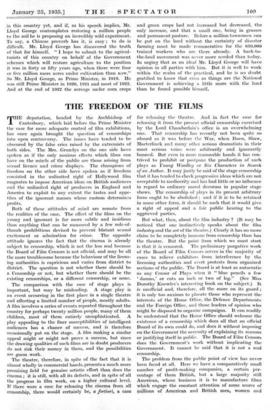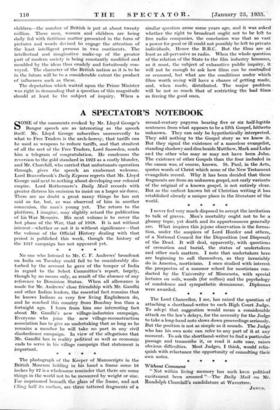THE FREEDOM OF THE FILMS
THE deputation, headed by the Archbishop of Canterbury, which laid before the Prime Minister the case for more adequate control of film exhibitions, has once again brought the question of censorships into open controversy. The issues have tended to be obscured by the false cries raised by the extremists of both sides. The Mrs—Grundys on the one side have spoken as if the only noxious effects which films can have on the minds of the public are those arising from sexual licence and crime displays. The champions of freedom on the other side have spoken as if freedom consisted in the unlimited right of Hollywood film magnates to impose American ideas on British audiences and the unlimited right of producers in England and America to exploit to any extent the tastes and appe- tites of the ignorant masses whose custom determines profits.
Both of these attitudes of mind are remote from the realities of the case. The effect of the films on the young and ignorant is far more subtle and insidious than anything that can be measured by a few rule-of- thumb prohibitions devised to prevent blatant sexual excitement or admiration for crime. The opposite attitude ignores the fact that the cinema is already subject to censorship, which is not the less real because the Board of Film Censors is not official, and may be all the more troublesome because the behaviour of the licens- ing authorities is capricious and varies from district to district. The question is not whether there should be a Censorship or not, but whether there should be the existing censorships, or a different censorship, or none.
The comparison with the case of stage plays is important, but may be misleading. A stage play is an event occurring in the first place in a single theatre and affecting a limited number of people, mostly. adults. A film involves a series of events repeated throughout the country for perhaps twenty million people, many of them children, most of them entirely unsophisticated. A play appealing to the finer susceptibilities of intelligent audiences has a chance of success, and is therefore occasionally put on the stage. A film making a similar appeal might or might not prove a success, but since the drawing qualities of such films are in doubt producers do not risk their money in them, and the possibilities are .guess .work. _ .
The theatre, therefore, in spite of the fact that it is almost wholly in commercial hands, presents a much more promising field for genuine artistic effort than does the cinema ; it is still, with all its defects, and in spite of all the progress in film work, on a higher cultural level. If there were a case for releasing the cinema from all censorship, there would certainly be, a fortiori, a case for releasing the theatre. And in fact the case for releasing it from the present official censorship exercised by the Lord Chamberlain's office is an overwhelming one. That censorship has recently not been quite so absurd as it was before the War, when Ibsen, Shaw, Maeterlinck and many other serious dramatists in their most serious veins were arbitrarily and ignorantly banned. But even in more reasonable hands it has con- trived to prohibit or postpone the production of such plays as Young Woodley or Six Characters in Search of an Author. It may justly be said of the stage censorship that it has tended to check progressive ideas which are not acceptable to mediocrity and has had little or no influence in regard to ordinary moral decorum in popular stage shows. The censorship of plays in its present arbitrary form ought to be abolished ; and if it is to be retained in some other form, it should be such that it would give a right of appeal and a fair public hearing to the aggrieved parties.
But what, then, about the film industry ? (It may be noticed that one instinctively speaks about the film industry and the art of the theatre.) Clearly it has no more claim to be completely immune from censorship than has the theatre. But the point from which we must start is that it is censored. The preliminary purgative work of the Board of Film Censors serves in the majority of cases to relieve exhibitors from interference by the licensing authorities and avert protests from organized sections of the public. The Board is at least as autocratic as any Censor of Plays when it " blue pencils a few ' damns,' or cuts an inch or two of leg." (See Miss Dorothy Knowles's interesting book on the subject.) It is unofficial and, therefore, all the more on its guard ; it is only too anxious to placate those who represent the interests .of the Home Office, the Defence Departments and the Foreign Office, and those leaders of opinion who might be disposed to organize campaigns.' It can readily be understood that the Home Office should welcome the existence of a censorship which does all that an official Board of its own could do, and does it without imposing on the Government the necessity of explaining its reasons or justifying itself in public. The Board of Film Censors does the Government's work without implicating the Government. It cannot be said that it is not a real censorship.
The problem from the public point of view has never been faced at all. Here we have a comparatively small number of profit-making companies, a certain per- centage of them British, but a large majority still American, whose business it is to manufacture films which engage the constant attention of some scores of Millions of American and British men, women and children—the number of British is put at about twenty million. These men, women and children are being daily fed with fictitious matter presented in the form of pictures and words devised to engage the attention of the least intelligent persons in two continents. The intellectual and imaginative make-up of the greater part of Modern society is being constantly modified and moulded by the ideas thus crudely and fortuitously con- veyed. The character of the British nation as it is to be in the filture will be to a considerable extent the product of influences such as these.
The deputation which waited upon the Prime Minister was right in demanding that a question of this magnitude should at least be the subject of inquiry. When a similar question arose some years ago, and it was asked whether the right to broadcast ought not to be left to free radio companies, the conclusion was that so vast a power for good or ill could not possibly be left to private individuals. Hence the B.B.C. But the films are at least as all-pervasive as radio. When the whole question of the relation of the State to the film industry becomes, as it must, the subject of exhaustive public inquiry, it will not be enough to ask how films can be controlled or censored, but what are the conditions under which films worth seeing will have a chance of getting made, and, when made, distributed. The major problem will be not so much that of restricting - the -bad-- films as freeing the good ones.















































 Previous page
Previous page